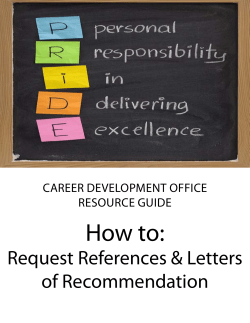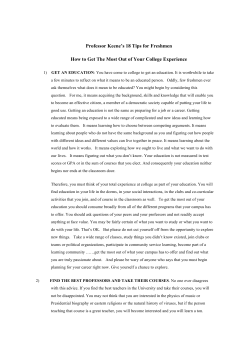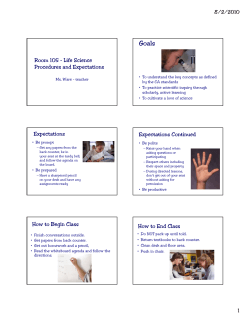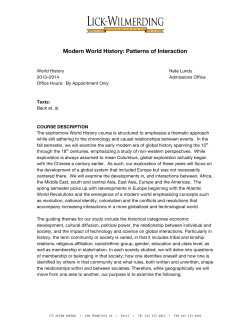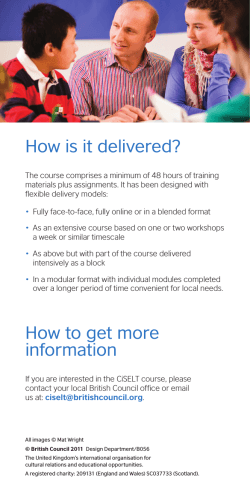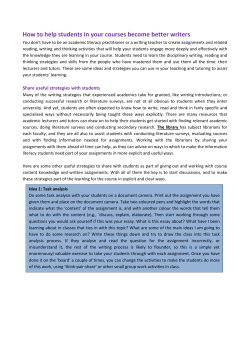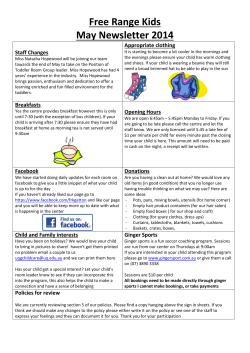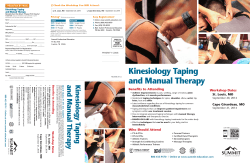
HOW TO NAVIGATE THE FIRST YEAR IN COLLEGE Balabolka
HOW TO NAVIGATE THE FIRST YEAR IN COLLEGE Try reading this article with free text-to-speech software such as Balabolka Just for Freshmen: Tips for Academic Success! Success Takes Time! Success in college takes more than brains -- it takes time. College work requires a lot of independent learning. You will need to schedule time to go to the library, write up lab reports, meet with professors, and take care of other academic business. Compared to high school, you will be spending few hours in class; 12 to 16 hours a week is typical. However, you will be expected to spend twice that much time preparing for each class. For example, if you are taking 12 credit hours, you should plan to spend 24 hours a week on homework. Twelve hours of class time, plus 24 hours of homework time equals 38 hours devoted to school each week. This is the equivalent of a full-time job! In college, completing assigned homework is just the start and is often not enough to ensure success. Professors expect you will do whatever is necessary to master course material. This means going above and beyond what's assigned. Use your weekly study time wisely: recopy class notes, make and study flash cards, or create sample test questions. Getting involved in a study group is also a good way to make friends and test your knowledge. Have regular meetings with professors to keep track of your progress. By investing time each week, you can keep grades up and reduce stress at exam time. So while you are planning time for eating, sleeping, and having fun, be sure to schedule enough time to prepare for class. That's the key to success! By Julie Givans The 'Golden 20' for Academic Success! Go to class. Be on time. Sit to the front and center of the classroom. Bring a pen, paper, notebook, and books. Dress like a student (not like an athlete, rap star, rock musician, or surfer). Show respect and enthusiasm to your instructors. Listen, listen, listen--you can't learn while talking to your peers during class. Pay attention--don't doodle, doze, or daydream. Try to contribute once per class period, with a question or contribution to discussion. Participation counts--and helps. 10. Have clearly marked notebooks, with separate sections--or separate notebooks--for each class. 11. Take notes. 12. Use a dictionary. This will increase your vocabulary and teach you correct spelling. 13. Have a partner/"buddy" system for studying. Have parents, friends, dormmates, etc. quiz you. Form study groups. 14. Read, read, read. Read magazines, the newspaper, sports books, science fiction, anything you can get your hands on. 15. Set aside at least three hours a day, six days a week, to study. 16. Get some of your homework done during school. Use free periods, extra time between classes, and the time before sports. 17. Sacrifice and work during times when you know other people aren't working. Work on a Friday night or Saturday afternoon. It will be worth it. 18. Volunteer for extra credit. 19. Get involved in extracurricular activities. Don't merely attend classes and go to practice. Join the Government Club or Cultural Awareness Organization, write for the student newspaper, give tours, etc. Get involved. 20. Work hard and be proud that you are working hard and learning. Realize that education is a key ingredient to many great things that you will accomplish in life. By Steve Turner 1. 2. 3. 4. 5. 6. 7. 8. 9. College Motivation College Success is More Than Academics "I used to think that the best way to succeed in school was to study, study and even study some more. I realized the saying that 'all work and no play makes Jack a dull boy' really holds true at the college level. College success is more than just academics; it's learning how to be an adult for the first time in your life. It's about developing tremendous interpersonal relationships with professors, counselors, and most importantly your peers. It's the whole college experience that enables one to truly succeed. Meeting new people, opening your mind to different ideas and cultures, and most importantly, the enjoyment of the four plus years that you're in school. Years from now, you will look back and consider your time in school as one of if not the best time of your life. That being the case, I strongly recommend that yout take time and appreciate each goal that is achieved. If you don't take time to 'pat yourself on the back', more so than not, no one else will. Two things to keep in mind: 1. You are your biggest supporter and your harshest critic. 2. Remember to respect your goals that you are trying to attain and appreciate and reflect on the ones you have reached." By Greg DiStefano Ask Questions "Being a freshman is always challenging, as you step into a new world of exciting adventures. Maybe you've heard a lot about Albert Einstein, William Shakespeare, or perhaps Abraham Lincoln, but you never had the chance to read or actually have someone tell you about their works and what they did for society and the entire human race. And so, as you step into college you should be ready to explore what was once a dormant seed in you and erase the fear of college and being a freshman. Life is full of new adventures and being a freshman is no different. Although it may seem a little difficult at first, the key to success is determination and motivation. Always think positive. Ask questions. Remember, no question is a dumb question. You go to school to learn, so take advantage of it and go for it." By Dr. Karim Hossain Positive Thinking and Science "Because of past negative experiences, many students are anxious about being in science classes. They're convinced that they can't do any science because they did poorly in these courses in junior high and high school. If you tell yourself that you're going to fail, you will. As difficult as it may seem, you have to adopt a positive attitude. Anything you believe you can do, you can do. I give this advice to all my students. Many come in convinced that they can't do biology and 15 weeks later they express amazement at how well they have done. Listen to me. Adopting a positive attitude has proven effective for many students. It will work for you." By Dr. Dale Hunter Setting Goals "Little is done by any of us without motivation and a goal in mind. Motivation is the internal fire which allows each of us to ascend to something we have yet to achieve. For university students, a goal to graduate provides one of the first destinations as we journey down the academic road toward fulfillment of our degree. Remain focused on your goal to graduate. The path leading to a degree will have many options along the way which can entice you to deviate from your goal. Each time you pass one of these deviations you will strengthen your motivation to remain on course. Although we can all be temporarily mislead in our journey, if your goal is sound and your motivation to achieve your goal is high, you will be successful. Keep in mind that the education you receive at your university will provide you with the knowledge necessary for the attainment of many future goals." By Bob McConnell Setting Priorities "Approach your college education as a game or competition. Set goals that are reasonable for each of your classes and then establish a game plan to be successful. Establish priorities in your study habits by managing your time correctly. Be prepared for each class every day with a positive attitude. You will only get out of each class what you put forth in effort. We tell our players to not waste time because it's so valuable. One method we teach them is to make flash cards or note cards that they can carry with them at all times, and then if they are waiting for someone or just have some time on their hands they can take their cards out and review them. With flash cards you can also make-up a game or competition of knowledge in each course so that the material becomes more interesting to learn. Finally, never get discouraged and always continue to be persistent toward your goals. If you know your goals, are persistent, and properly prepare for each class you should meet with great success." By Stan Swank Keeping Things in Perspective "Do you sometimes find yourself confused about things and can't concentrate on your coursework? You do have many decisions to make in the next several years, and some of the answers might come easily to you, and others might not. You may be with other students who have known all their lives what they want to be, or where they want to live, or who they want to marry. You may find that some of your own plans are no longer right for you, or some of the values that you believed in are no longer valid, or that you are no longer certain who you are. These confusions are difficult for any of us to handle, and they can sometimes prevent us from spending enough time on our courses. My first tip is don't panic. You're not the only one with these kinds of questions. In fact, just about all students go through this during their college years. The right answers will come to you in time, and this process marks you as an adult. It's still a rough experience, but sometimes knowing that most college students go through this CAN help to ease the shock of it happening to you. My second tip is to remember that you're not alone. There are many offices, people and services at your university that are designed to help you through these times. Know who and where these are, and don't hesitate to use them. So good luck, and remember to keep things in perspective." By Philip Kerstetter Passing Life's Test "In life people want the best. You got to work harder and rougher than the rest. For if you really want to pass life's test do well in school and you'll get to the next. So while you're in school--you get all that you can. I'm talking school smarts--you get all that you can. Cause in the real world you want to be the man. So get all that you can. Get all that you can." By Ledell Miller TRIALS AND TRIBULATIONS IN COLLEGE Physical Fitness "It's a tough job to be a student. The endless assignments and stockpiles of information. It can make you into an academic couch potato. Therefore, don't neglect a balanced lifestyle -- the active with the academic. Keep your physical self in tune. There's substantial evidence which shows that high academic performance is more likely to occur when you're physically fit. Obvious conclusion? Routinely take yourself out for a jog, or a vigorous walk, or hit some racketballs, or play basketball -whatever you can enjoy. Make it something that cranks your internal machinery into high gear for at least twenty minutes each time. Do this no less than three times a week. Wow -- that can be an investment of only an hour a week, and it's basically free. In return, your body will thank you and your brain will be refreshed." By Bob Gensemer Seek Help When Needed "Take this tip from a student who knows. Don't let those studies get behind. If you're having a difficult time in a course, falling behind, or spending too much time having a good time, this message is for you. Ask for help now, before it's too late. When I started college, I wasn't aware of the importance of an education. I was a freshman who didn't know what I wanted. When I fell behind, I skipped class rather than going for help. This put me on academic probation. I was lucky though, I found help through the Academic Support Services. They helped me find a direction, and I learned there are tutors available to help with those troubled classes. Class stopped being a burden and began to be interesting. I realized I could do the work and people here helped me to focus. If you feel like things are generally over your head, get help. There are people who care about you and want you to succeed. Take advantage of the help that is provided to you. Remember, you are here for a reason. Don't party yourself out of school. You can do it." By Tracy Hergenroeder Withdrawing From a Course "None of us likes to have to quit in the middle of something we've started, but sometimes it's the only alternative. Withdrawing from a course is not something to be taken lightly, but unforeseen things can happen that make it necessary. If you find yourself in the position of having to withdraw from a class, know the rules. The last day to withdraw from a class with a "W" grade is posted at the beginning of every semester. After the official withdrawal date, withdrawing from a class is possible for extenuating circumstances, but it's a more complicated procedure and it will only be approved if the reasons are truly extenuating. Keep in mind that poor classroom performance is NOT an extenuating circumstance. It is also important to be familiar with any financial aid implications before withdrawing from a class." By Linda Lacny Campus Involvement "The college experience is certainly a unique one that will have many implications for the rest of your life. It is important to dive right in. The experience will be more rewarding and enjoyable if you step right up to the plate. Get involved in campus life, not only in the classroom, but in other areas as well. Life will surely be easier if it is shared with the people around you. Many students are timid when it comes to talking with others, especially teachers. Talking with and getting to know your instructors is as important as showing up for class. Teacher-student involvement is an indication of a serious and committed student. So study hard, get involved, and enjoy yourself!" By Shawn Reagan Top Ten Reasons: Why Are You Flunking Out? "I'm bringing you, direct from the home office in Sioux City, Saskatchewan Today's "Top Ten List." The subject of this Academic Survival Top Ten List is "why are you flunking out of Edinboro University?" O.K., here we go, the top ten reasons you're flunking out of Edinboro is: #10 All the professors in this school are morons. # 9 The cafeteria food is secretly laced with a chemical that makes me stupid. # 8 A college degree is over rated. Sharon Stone did not complete her Edinboro academic program and look how famous she is. # 7 A college degree is really unnecessary. John Wayne Bobbitt doesn't have an Edinboro degree and he seems to have put things back together pretty well. # 6 The scheduling computer predetermines my failure. How could I possibly be expected to attend classes that begin before noon? # 5 My QPA is 0.20 right now. However next semester I'm joining the fraternity. They have all the tests and required academic materials on file so I can expect a 4.00 next Fall. # 4 I'm an important link in the local Edinboro economy. Shoot, if I went to class and studied, the "Hotel" would probably go bankrupt. # 3 Human development necessitates a prioritizing of one's life. Right now I'm concentrating on my socialization skills. # 2 It's not what you know but who you know. So right now I'm dating 3 of my professors. # 1 I'm not failing the system, the system is failing me. O.K., so there are a lot of reasons for not doing well academically. However, some day you've got to accept that you, and you alone are responsible for your life and its success or failure. If you are not trying to be the best student you can be right now, you're wasting time, money and risking your chances of future happiness. Quit whining! Get to class and keep up on your assignments. That task should be #1 on your 'Top Ten List.' " By Doug Watts College and Alcohol "Most people come to college expecting to have a good time while they're here, and some think that means drinking games or chugging contests. Did you know that most students at Edinboro don't drink heavily? Fewer than half drink even once a week, and only one in five drinks three nights a week or more. On the whole, at every campus in the country -- including Edinboro -- the less students drink, the better their grades are. Think about it. If you drink lightly -- or not at all -- you're much less likely to miss classes, do poorly on an exam, have trouble concentrating, or have to spend time dealing with the aftermath of a binge. So take a minute to look at your lifestyle and make some healthy decisions about alcohol and other drug use. If you choose not to abuse, you not only have a lot of company at Edinboro, but you're far more likely to succeed academically." By Mary Anne Weiner Stay Clean and Stay Cool "College can be a transitional period for many students. It's hard to know what to expect--academic pressures, different environment, making new friends and "fitting in". WOW! I used to think fitting in meant hanging out with my friends and drinking all the time. Now that I am in graduate school, I realize that one doesn't have to drink to have fun. Alcohol is a drug. You don't have to drink or do drugs to be 'cool'. Be high on life, not drugs. And remember it is O.K. to say NO. Don't let someone tell you that you have to drink or it's O.K. to just have one beer. If you don't want it don't take it. If someone is your friend they'll understand." By Valerie Smith SURVIVAL TACTICS Set up regular study hours. By now, you may be saying to yourself, "This lady is nuts if she thinks I'm studying regularly in the summer, when I didn't even do that during the year." OK. But if you would take even as little as 1 hour a day and devote it to keeping the blade sharpened, it would yield great results. In fact, this is a great idea to remember: Small changes can result in big wins. Look at pro golfers and pro athletes in general. The person who loses a tournament is not dramatically worse, just a small fraction, but that makes a huge difference. Read-choose anything-but read something. There's an ad that occasionally shows on TV that says, "Reading is fundamental." Remember that ad and act accordingly. Your reading will determine much of your success or failure in college. Many students don't enjoy reading; so, they do less and less of it. It's a simple but inevitable, progressive process. Start by reading whatever you like. I don't care if it's soup labels, comic books, short stories or cowboy novels: Read. As you read more, your interests will broaden; the progressive process will happen naturally-trust me. If you can't get through long chapters, you need to investigate technology, such as the Intel Reader or Kurzweil Reader, to read material aloud to you as you follow along in the book. This will increase your comprehension as well as your reading effectiveness, and it will take the “hard work” out of reading and allow you to concentrate on understanding. Start keeping a daily calendar. Poor time management causes some of the worst problems students have in college. During class discussions my students always stress this one. Here's the problem: In college you'll have what seems like loads of time. You may only average 3 or 4 hours of class a day. So it seems like there's time to burn. Also, it's unstructured time-the type that slips through your fingers like sand. However, the projects and homework assigned in college are much more substantial than those in high school, with virtually no oversight by teachers or parents. The combination of unstructured time and larger projects proves disastrous for the firstyear students who don't keep a calendar and schedule their work. This problem is not limited to students in college. In fact, one of the hottest professions in the workforce is project management. Buy yourself a monthly calendar. Monthly ones work best because you can "see" one month ahead. Weekly calendars are too short-sighted. I suggest you practice setting up milestones and timelines for simple projects this summer. Write them on the calendar. Just get used to using it before you're in the middle of the first semester wondering how in the world you'll ever survive. Write constantly. Runners know that to make it through a race, they have to develop their wind. Simply put, they have to practice running to be ready for the race. So it is with writing. If you don't write regularly, you lose the edge, the confidence, the fluency. Start by keeping a daily journal. Buy yourself a spiral notebook or my personal favorite, one of those black-and-white marble covered composition books you used in elementary school. But begin writing. Start with your random thoughts. What you think about what's going on around you: Your hopes, fears, and dreams. Like reading, it does not matter what you write but that you do write regularly. Like reading, writing is a fundamental of college life. You'll get far more writing assigned in college than you did in high school. The other effect of keeping a journal is that if you read what you've written, you'll find it a great way to sort out where you're headed. Your writing will reveal what's going on inside your head. Writing can be sounding board, like a friend who listens to your innermost thoughts. The journal is the best way I know to build up your writing wind. Set a 100% show-up goal. Make it your goal to show up to 100% of your classes 100% of the time. Start off with that fixed in your mind. Put everything else in second place, right from the first day on campus. School is your primary job. If you were to miss work every time you thought it was a nice day or whenever you had a headache, or-you fill in the excuse-think about how long it would take your boss to fire you. Go for perfect attendance. It sounds like an elementary school concept, but believe me it's critical. Communicate with the professor. Call, e-mail, or send a note with a friend if you're sick. Sounds kind of goofy? Maybe, but it makes an impression. Again, it sends an important message: "I care enough to let you know I am on the injured list, but I'm still on the team." Again, use e-mail, phone, fax or personal note, but make sure you try. Ask two people for their notes and phone numbers. This may sound like overkill to you, but it's not. As I mentioned before, it's hard enough interpreting your own notes, let alone someone else's. By getting copies from two classmates, you're more likely to piece together what actually happened. Double check about assignments or handouts. Be absolutely sure that you check with two classmates or the professor about any handouts given out in the class you missed. Also, check on whether any new assignments were given, or if modifications/clarifications were made. I have found that this is one area where students constantly fumble. While they get the notes, they often forget to ask for handouts or special instructions given. Usually, the result is that you may turn in a project only partially completed and receive a poor grade. Audio tape, or use LiveScribe pen, if permitted. To get 100% recall of a class you missed, audio taping is the best way. Asking a friend to tape a class you'll miss is a bit burdensome, but very useful. You (or your friend) must check with the instructor first. Don't tape without the professor's permission. Some teachers do not like being taped. Most will not care. By the way, I have found that taping classes even when you are there, especially for those classes where you're having trouble, is a great idea. My daughter did that in college and found that taping supplemented her notes and helped her studying tremendously. But remember: Always ask permission first. WHAT HAPPENS WHEN YOU MISS A CLASS? Woody Allen once said, "Showing up is 88% of life.". Let me adapt that for college: Attendance is 95% of college academic life. If you skip class for one of a hundred excuses you may fabricate, you lose…every time. Recently a student came to me with a partial assignment saying that he did not know about the additional requirement that had been announced in class for the past two weeks straight. My response was, "Whose fault is that?" No more discussion. You simply cannot get the information or assignments straight if you're off playing touch football, catching a movie, or just sleeping in. What happens when you miss a class? Several things: You miss assignments and changes to assignments. Teachers must amend projects by the very nature of academics: Information changes, equipment is not available, or stuff happens. In any case, you have to be there to get the scoop. You get behind. Even if someone takes notes for you, you fall behind. It's tough enough to understand your own notes two or three days after you've taken themunless you review them soon after you take them. After a while you slowly but surely slip so far behind that you'll never catch up. It's a slippery slope and it's hard to climb back up once you've slid down. You project an I-don't-give-a-damn attitude to the professor. Trust me. Professors notice the no-shows and give no breaks to students who skip class. NONE. Think about it. Professors take their subjects seriously. They spend years preparing and researching to qualify to teach. And then students skip class with no more excuse than it was a great day to sleep in or to get an early start on the weekend. Professors notice the no-shows. Just the opposite message comes through when you do make it to class. You show that you're concerned, dedicated, and ready to learn. In fact, it has been my experience that if a student makes the attempt by being there for every class, turning in all the assignments, and by calling or stopping by for extra help-I will go the extra mile or two to help. Most teachers I know are in the profession to help people. But we can only help those who are available and willing to meet us halfway.
© Copyright 2026

